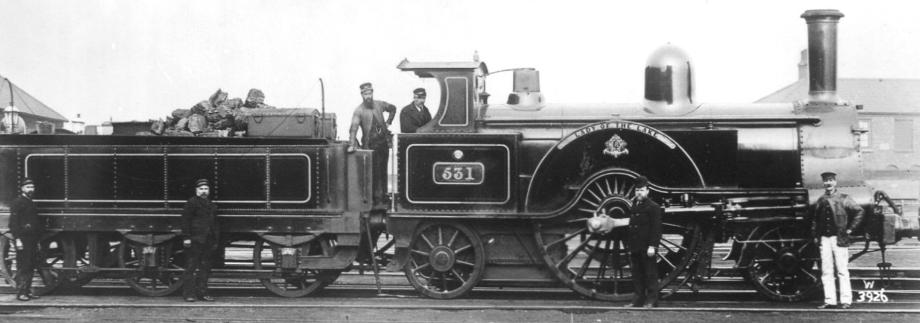2-2-2 Problem Class LNWR Profile and Models

531 'Lady of the Lake'. Unknown location and date. ©Public Domain
|
The London and North Western Railway (LNWR) 7 ft 6 in Single 2-2-2 class was a type of express passenger locomotive designed by John Ramsbottom. The class is better known as the Problem class for the first locomotive built, or the Lady of the Lake class for the example that was displayed at the International Exhibition of 1862. The first examples were built shortly after the acquisition of the Chester and Holyhead Railway by the LNWR, and primarily saw use on the Irish Mail route from London to Holyhead. They were the first locomotives to be fitted with water scoops, which could refill the tender from water troughs between the tracks without stopping. One such locomotive, No. 229 Watt, was the first to use them in non-stop run from Holyhead to Stafford in 1862, while conveying despatches relating to the Trent Affair. The Lady of the Lake class locomotives spent their initial years working the Irish Mail traffic, as well as running local express services in the Manchester, Crewe and Liverpool area. They gained a reputation as "flyers" on the Irish Mail, even though the speed required by the Post Office contract (a 42 mph (68 km/h) average) was not particularly fast by contemporary standards. As steam locomotive technology developed, the class became slow and uneconomical. They were all scrapped by 1907. |
|
|
Type of Locomotive |
Steam |
|
Builder |
Crewe Works |
|
Build Date |
1859 to 1865 |
|
Total Built |
60 |
|
Tractive Effort |
Unknown |
|
Wheel Configuration |
2-2-2 |
|
Operated By |
London & North Western Railway |
|
Main Duties |
Express Passenger |
|
In Service Until |
1907 |
|
Surviving Examples |
0 |
Products awaiting categorisation
| Scale | Brand | Image | Construction Type | DCC Capability | Product Code | Product Title | Livery |
|---|---|---|---|---|---|---|---|
| OO Gauge (1:76 Scale) | Keyser (K's) |

|
Not set | Not set |
ML-2 View |
LNWR Problem Class 2-2-2 Steam Locomotive Kit | Awaiting Categorisation |
